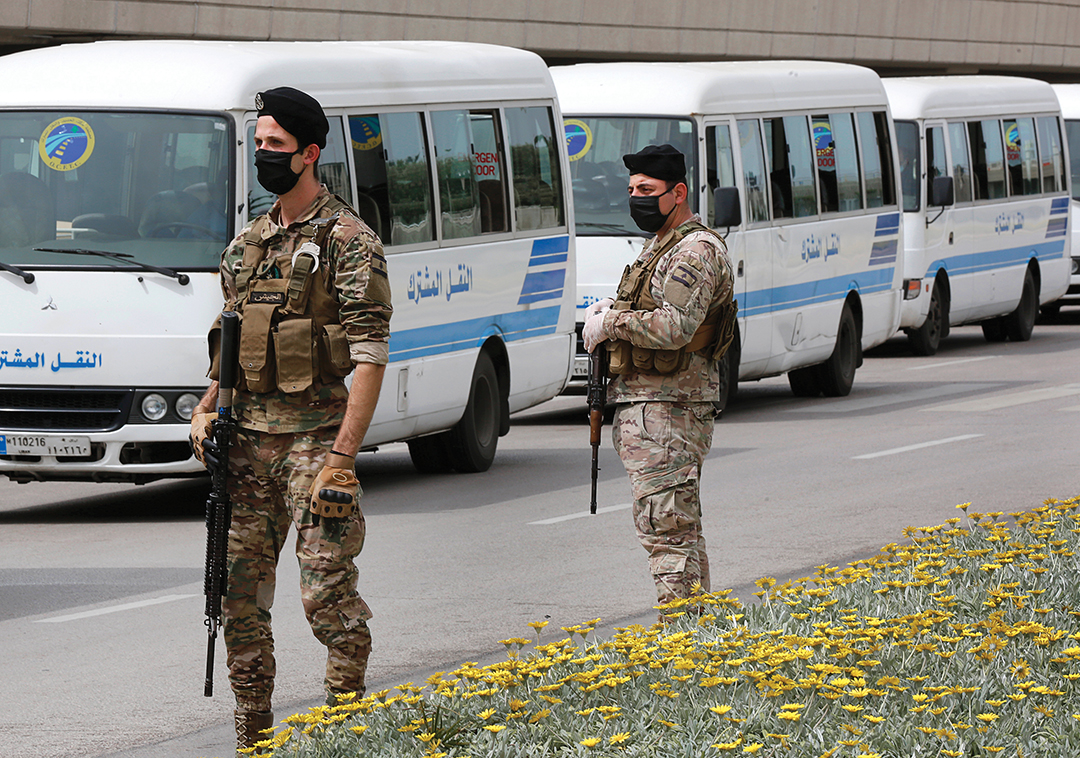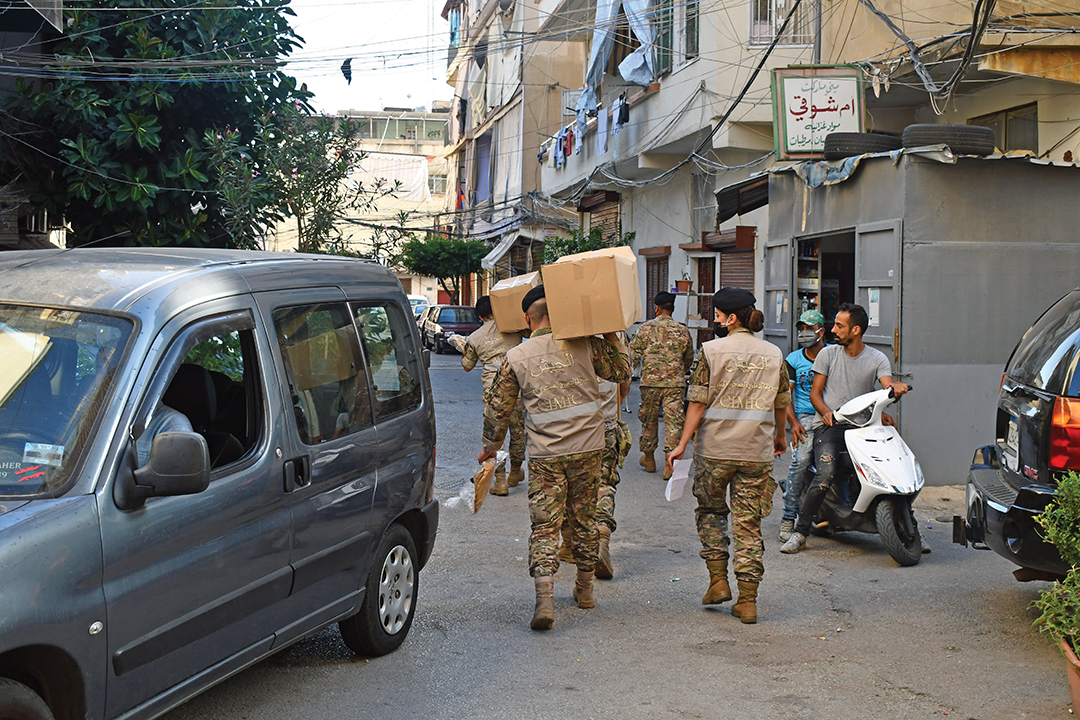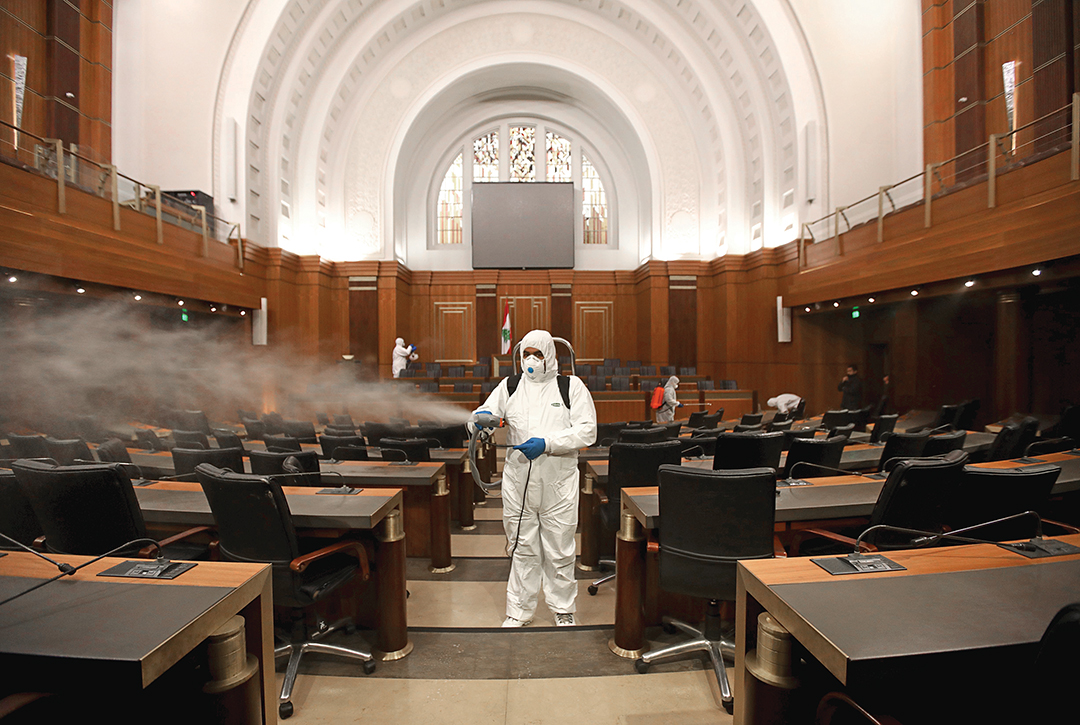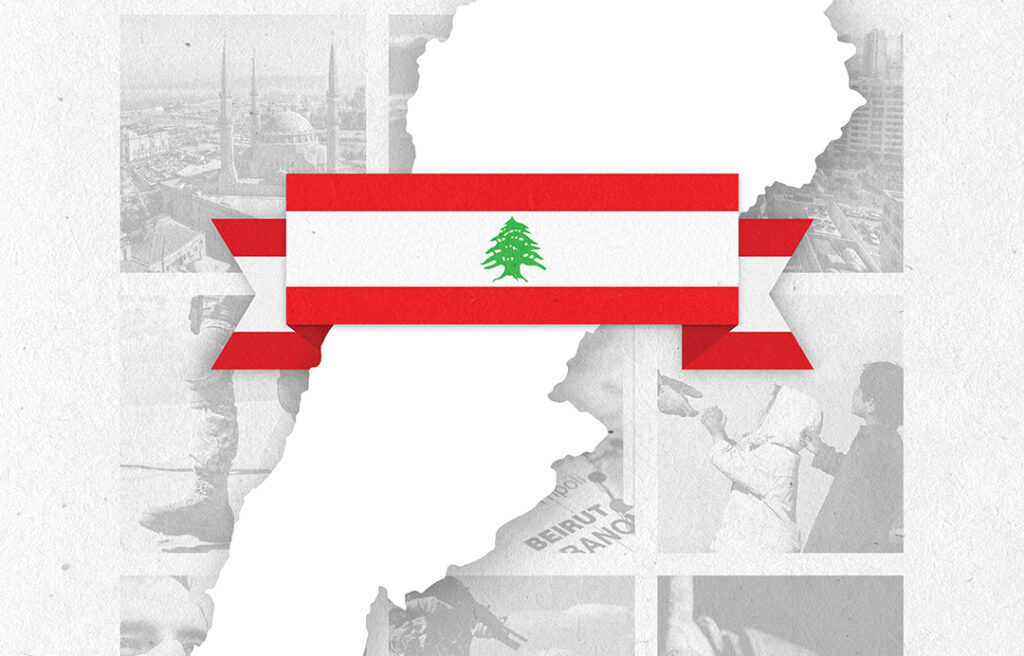Lebanese military units have stepped forward to stop the spread of the coronavirus and limit civil unrest
LEBANESE ARMED FORCES DIRECTORATE OF ORIENTATION
The Lebanese Armed Forces (LAF) relies on the slogan of “honor, sacrifice, loyalty” when performing its missions: the honor of serving and defending the nation while making endless sacrifices and displaying absolute loyalty.
Ever since the LAF was assigned to assist the Lebanese Internal Security Forces in keeping peace and stability in 1991 throughout Lebanese territories, the military became the backbone of national stability and took upon itself the mission of providing protection for state institutions so that the country may rise again and eliminate the effects of war.
In parallel, the military followed a steady and ascending path in building its capabilities based on the principles of sound civil education and by avoiding sectarian and political bickering. It applies the values of transparency and competence through a long and continuous path that stretches to this day to provide military units with needed weapons and equipment. In addition, the troops benefit from continuous training programs that enable them to perform duties under all circumstances in terms of fighting terrorism. Battling terrorism allowed the LAF to achieve exceptional feats. The military’s professional performance qualified it to become a trusted and effective partner of other armed forces and security agencies in friendly countries.

The LAF spared no effort in helping the Lebanese people with social and development projects, and it was assigned with great responsibilities, mainly relief and rescue work, assisting citizens, extinguishing fires and opening roads during snowstorms. Moreover, the LAF assisted with several development projects in cooperation with ministries such as the Ministry of Culture and the Ministry of Agriculture by participating in campaigns to clean archeological sites, plant trees, remove litter from the coast, and spray insecticides on farmers’ fields from helicopters to battle agricultural pests.
Based on the LAF’s desire to continue and coordinate these efforts, it established the Directorate of Civil-Military Cooperation (CIMIC) and was tasked with distributing aid packages that included food parcels, school bags, textbooks, clothes and blankets. The directorate also focused on projects such as rehabilitating schools, lighting streets, building sports courts and digging wells. Additionally, the LAF continued to offer courses in different cultural and educational fields. They included literacy campaigns and vocational training in sewing, embroidery, carpentry and other professions in cooperation with civil society organizations and local and international actors, particularly the U.S. Agency for International Development.
The main aim of these projects is to improve the living and educational conditions of the population as well as to alleviate their suffering and improve their professional skills so that they can work to support their families.
At the time of writing this, the Lebanese Armed Forces (LAF) once again responded promptly and professionally in answering the call for help during the Beirut port explosion. While much is unknown about the disaster that took place on August 4, 2020, many citizens have found comfort in the sight of the LAF providing evacuation and medical assistance. Their ability to stand ready to aid the country shows they are the legitimate providers of security and safety for Lebanon, embodying the mantra “honor, sacrifice, loyalty.”

CIMIC also provides longer-term assistance in non-emergencies. Since an up-to-date and accurate population census was unavailable, the CIMIC Directorate was assigned the mission of preparing the lists of names, in coordination with the Ministry of Social Affairs, to give every deserving person his right. CIMIC was also assigned with setting up a comprehensive plan aimed at distributing this aid in different regions according to urgent priorities. Accordingly, a detailed schedule was set up and divided into several stages.
The implementation of this plan was entrusted to the military units deployed throughout the country in cooperation with the local authorities such as municipalities and mayors under the direct supervision of the CIMIC Directorate to ensure proper functioning. This step was highly appreciated by the citizens, who consider the Army a guarantor of their rights regardless of regional or sectarian considerations.
The spread of COVID-19 brought the country to a complete standstill. The disease posed a health risk to citizens and aggravated the economic and social hardships that the country was suffering from. The Army responded swiftly and by reducing the spread and implementing strict measures within the military to halt the outbreak by enforcing the wearing the protective masks inside closed spaces and while conducting missions.
The disinfection process and measuring temperatures at the entrances of all military barracks were enforced, and a number of military units took up the charge of producing protective masks and disinfectants according to the specifications and standards of the Lebanese Ministry of Health. The produced items were distributed to the troops and helped ease the military’s burdens.
These measures supplemented the work of medical professionals in Military Healthcare, which started providing hospitalization at regional military medical centers to preempt overcrowding at the Central Military Hospital. Military Healthcare limited its services to urgent and necessary medical examinations and opened a COVID-19 testing center.
This section was dedicated to receiving potential COVID cases, making all necessary tests to reduce the burdens on government-run hospitals and accelerating early detection of virus cases to avoid its spread within military bases. The measures appeared to work: Data showed that the military, despite Soldiers’ heavy social interactions, suffered less from the disease than other institutions.

Since the beginning, the LAF has participated in national efforts to implement the mobilization plan passed by the government. LAF units took actions to ensure the highest level of commitment to the plan and to prohibit any gatherings and unnecessary movements. This occurred in coordination with all state institutions. The LAF Directorate of Orientation, in cooperation with the Ministry of Information, launched a massive media campaign to raise awareness of the dangers of the pandemic and the means of protection.
In parallel, Army units continued to implement measures related to the quarantine and general mobilization, according to the directives of the Lebanese cabinet. The LAF used all available measures to implement mobilization and resorted to helicopters to broadcast warnings to abide by quarantine measures and remain at home. In addition, motorized and foot patrols were dispatched to control and limit citizen movements and ensure compliance with measures to limit infections.
Despite the spread of the virus, the country suffered a wave of popular protests reflecting the increasingly deteriorating living and economic conditions. The LAF acted to guarantee freedom of expression and the right to peaceably assemble while prohibiting road closures. The LAF has made extensive efforts to halt aggressions against individuals and private and public institutions. While remaining impartial to all citizens, the LAF has sought to avoid any security disturbance that may escalate to a wider conflict.
All these challenges, despite their seriousness, did not diminish the resolve of the troops, who continued their duties armed with high spirits and unwavering determination. They did not succumb to exhaustion or rumors, and they continue to assume their responsibilities. This professional and patriotic approach displayed by the military enables it to handle internal tensions to preserve civil peace, safeguard national sovereignty, protect public and private institutions, and prevent any escalation of discontent that endangers civil peace while respecting freedom of opinion and expression and the work of different media outlets.
The Army is a unifying national institution that represents all Lebanese society in service to country. It is dynamic fount of hope for the Lebanese people, the first and last guarantor of people’s safety, devoting all its capabilities to protect the Constitution and civil peace, and warding off all those who would destabilize Lebanon.

